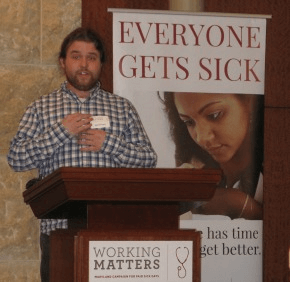By Erik Zygmont
“It’s amazing we have to be here discussing this tonight,” said Bishop Denis J. Madden, auxiliary bishop of Baltimore as he addressed the crowd of 100 or so that packed the Chapel of Peace at St. Ignatius in Baltimore in support of mandatory paid sick leave Jan. 11.
He noted that the Maryland bishops had addressed the matter two years ago in a statement on the dignity of work.
“It is in the best interests of all to enact reasonable policies that keep our workplaces healthy by allowing workers to stay home when they or their dependent family members are sick,” Bishop Madden said, quoting from the statement issued at the start of 2014.
The interfaith rally – attended by other religious leaders including the Rev. Kathy Shahinian of the Episcopal Diocese of Maryland; Rabbi Michelle Stern, chaplain at Mercy Medical Center in Baltimore; and the Rev. Julius Jefferson of the Heritage United Church of Christ in Baltimore – highlighted an urgent desire to get paid sick leave passed this year.
“We need to be impatient; we need to do this this year,” said Del. Luke Clippinger, a Democrat representing parts of south and southeast Baltimore and a lead sponsor of the bill, titled the Maryland Healthy Working Families Act.
“The more we can help people as they are moving through these lower paying jobs … the better a city we’re going live in; the better a state we’re going to live in,” said Clippinger, who is sponsoring the bill with State Sen. Catherine Pugh, a Democrat representing parts of West Baltimore.
Spencer Joyce, an employee of a grocery store and a big-box retailer as part of a “plot to go back to school and start a musical career,” spoke of his personal experience without paid sick leave.
According to Joyce, he went to work on Jan. 7 with a 101-degree fever and his “stomach in knots” because he feared he would lose his job if he stayed home to recover.
When confronted by his supervisor, Joyce told him that he hadn’t completed his work in a timely manner “because I’m sick and I don’t have any energy.”
Joyce said that he has worked in retail for most of his career and once worked for two-and-a-half years without any paid sick time.
He thanked his girlfriend – who he said was an employee of Working Matters, the coalition of organizations pushing for the passage of paid sick days – for inviting him to speak.
William McCarthy Jr., executive director of Catholic Charities of Baltimore, said he wished sick workers such as Joyce were allowed to stay home.
“I’m glad you’re feeling better; I was afraid to shake your hand,” he quipped.
“I don’t want my employees to get an elder sick or start a flu outbreak in one of our facilities,” McCarthy added.
He said that guests and clients of Catholic Charities facilities – many of which cater specifically to the homeless – have said “over and over again” that “lost (unpaid) sick time causes or exacerbates their spiral into poverty.”
He commended Amanda Rothschild, owner of coffeehouse and eatery Charmington’s, for allowing her employees paid leave in her business’s budget.
“A budget is a moral document,” McCarthy said. “It’s your priorities, and your priorities should be your people.”
Rothschild told the crowd she had offered her 14 employees paid leave from the start.
“I can tell you as a new business owner, as a small business owner, it’s possible,” she said, adding that the policy “saves us money” through reduced turnover.
Eighty percent of Charmington’s employees have worked there for more than a year, she said, and 65 percent have been there over three years.
The Maryland Healthy Working Families Act would require employers of 10 or more to give one hour of paid sick leave for every 30 hours worked. Full-time employees could earn up to seven days; part-time employees would earn less.
Employers of nine or fewer would be required to provide unpaid sick leave under the bill.
The bill would allow an employee’s use of sick leave in various situations, including the sickness of children or parents under the employee’s care. It would also allow the employee to use sick leave to obtain services related to domestic or other abuse, or to assist a family member in obtaining such services.
The rally, held two days before the Jan. 13 start of the 2016 legislative session in Annapolis, was hosted by the Justice and Peace Committee of St. Ignatius.
Candra Healy, chairwoman of the committee, said the group had hosted smaller events in support of paid sick leave in the past.
“We wanted to do something bigger this year and reach out more to the interfaith community,” she said.
Committee member Terry Cavanagh referenced Pope Francis, citing “a new energy toward social activism” coming down “from the very top” of the Catholic Church.
“If it was present before, it was hidden,” he said. “People are encouraged to be more energetic on those issues, and (paid sick leave) is one of them.”
Also see:
Bigger fight against assisted suicide in Maryland expected in 2016
2016 General Assembly Preview: Education tax credit back on front burner


